Institute of Healthcare Engineering Symposium 2019
14 November 2019
On 5 November, we hosted our second Autumn Research Symposium at Wellcome Collection.
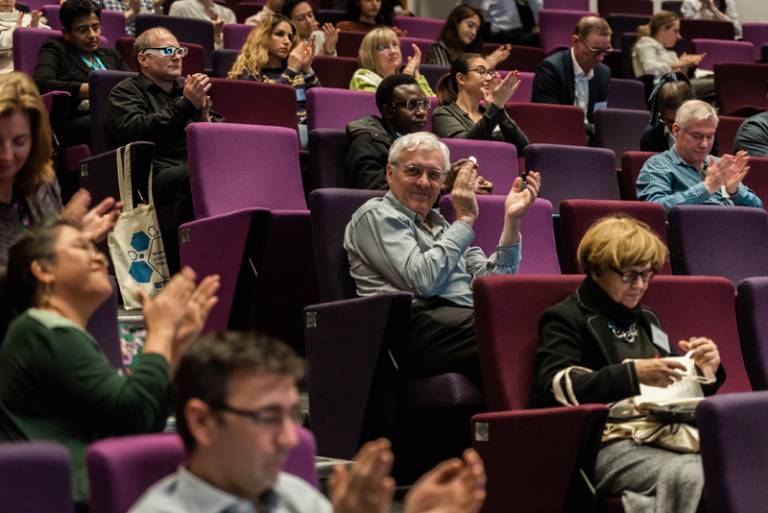
The symposium was a showcase of excellence in healthcare engineering across UCL and an opportunity for old and new members of our community to connect.
This year, we aimed for a departure from the traditional format of back-to-back talks. We wanted to capture the diversity of UCL’s healthcare engineering community through a mix of panel discussions, live research demonstrations and stories from people with lived experience. The event was grouped into three sessions based on our Institute’s key values: collaboration, innovation and translation.
We began with an introduction by Prof David Price (UCL Vice-Provost, Research) and Prof Becky Shipley (Director, Institute of Healthcare Engineering) who spoke about UCL and the Institute’s commitment to interdisciplinarity, and why this is essential for impactful research.
““This symposium is an opportunity to look back over the last year and celebrate our new initiatives, but also to look forward to the upcoming challenges and opportunities in healthcare engineering” - Prof Becky Shipley, Director, Institute of Healthcare Engineering
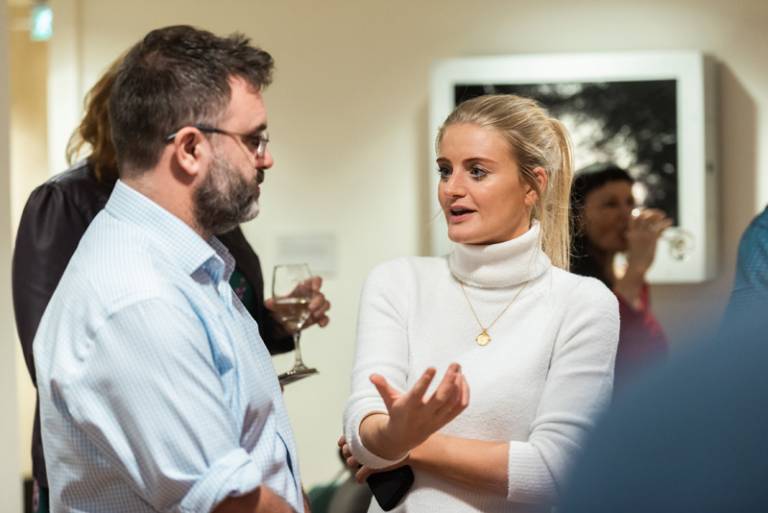
Collaboration
As a demonstration of what interdisciplinary collaboration looks like in practice, we heard from engineers and clinicians who work together successfully. Adrien Desjardins (UCL Medical Physics and Biomedical Engineering) and Malcolm Finlay (Consultant Electrophysiologist at Barts Heart Centre) spoke about their work to improve minimally-invasive surgical tools.
Malcolm said, “the real clinical need can be hidden from clinicians, and an engineering solution can be hidden from engineers. It can be hard when we’re busy thinking about treating the next patient to think about the tool we really need!”
“We’ve had a collaboration where I’ve been able to use some of my engineering knowledge, and Adrien’s been able to use some of his healthcare knowledge to really understand one another, and come up with solutions that are going to help people”.
We then heard from two of the Institute’s deputy directors, Prof Ann Blandford (Deputy Director, Digital), and Prof Elizabeth Murray (Deputy Director, Clinical). They shared how they initially struggled to communicate in each other’s technical language but found a way to work effectively together.
“We were using the same words, but we meant completely different things by them. Sometimes we used different words but meant exactly the same thing!” said Elizabeth.
““Collaboration is really important to what we do, but it can be really difficult. You need a very strong clinical and patient voice to articulate what the problems are, and you need the engineering perspective to see how technology can be used”.
In this session, there was a strong focus on the culture within healthcare engineering (and academia as a whole), and particularly why improving research culture leads to improved research outcomes. This segment is part of our ADAPT to Thrive initiative, in collaboration with the Academic Careers Office in SLMS. Throughout the year, we’ve been focusing on shifting perceptions of failure in the academic community.
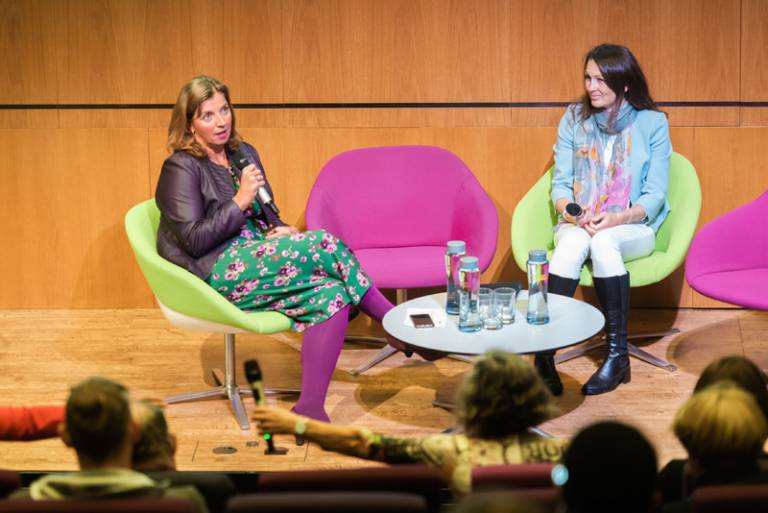
Prof Clare Elwell (right) and Dr Ivana Drobjnak shared their personal stories of setbacks and rejection in academia
We heard from early-career researchers and senior academics about moments where they’ve ‘failed’ and why we should view our setbacks as learning opportunities, rather than personal shortcomings.
Dr Cathy Holloway (Director of the Global Disability Innovation Hub) spoke about global collaboration in the context of her wheelchair access project in India, and also, effecting wider accessibility change.
She described the challenges that come with operating in a new environment: “Politically, it’s very difficult when you’re working globally. Sometimes you’re met with people saying ‘Who are you coming in here, telling us what to do?’
Cathy and her team have been working with non-government organisations and ministries of health to help countries understand what evidence they need to inform their policy on assistive technologies.
“Building that level of trust and confidence in each other has taken a long time but we’ve managed to get there”.
Global collaboration is a core priority for the Institute. We work with a wide range of international institutions and partners (including the All India Institute of Medical Sciences and the Indian Institute of Technology), and we are looking to expand the work we do in this area.
Research demonstrations
That morning we were also visited by Chris Skidmore, Minister of State for Universities, Science, Research and Innovation and representatives from Engineering UK who we have been working with on an outreach campaign for Tomorrow’s Engineers Week. The minister met with Prof Becky Shipley and her team, who demonstrated their REANIMATE project creating virtual simulations of cancerous tumours. The team exhibited this work in July at the Royal Society Summer Science Exhibition and are committed to increasing public engagement in research.
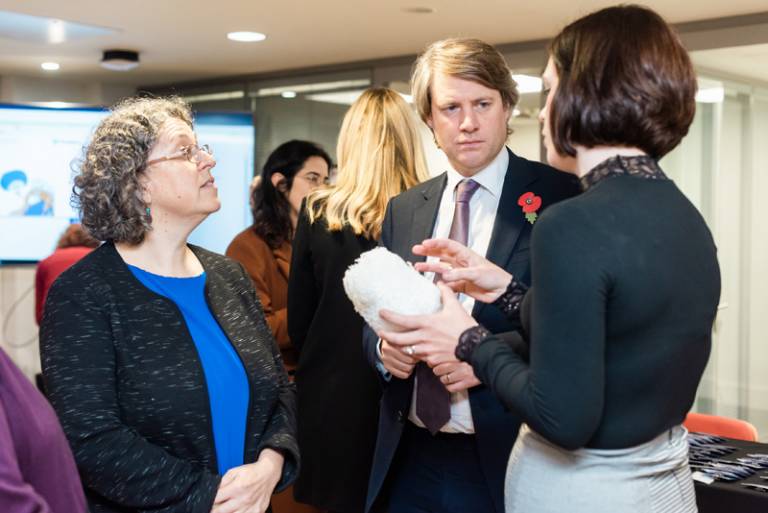
Left to right: Dr Hilary Leevers (CEO, Engineering UK), Rt Hon Chris Skidmore and Prof Becky Shipley
As well as the REANIMATE team, we had lunchtime demonstrations from colleagues at i-sense (focusing on digital health) and the Wellcome/EPSRC Centre for Interventional and Surgical Sciences (demonstrating work to improve surgical tools).
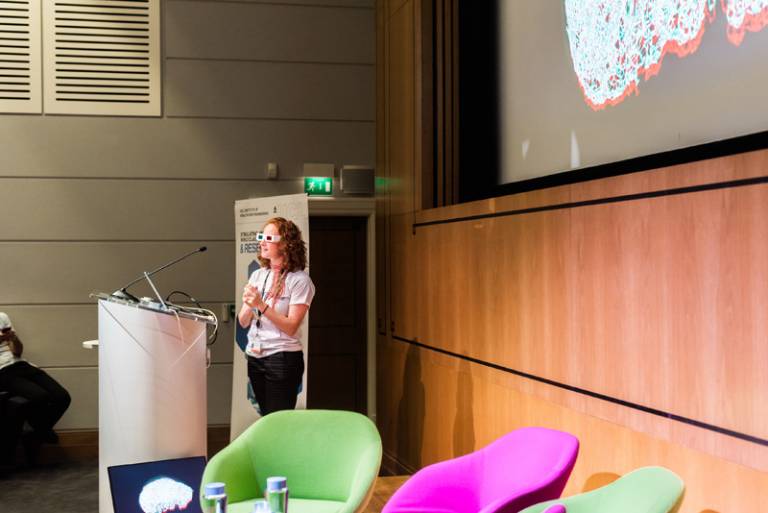
Dr Claire Walsh gives the audience a taste of the REANIMATE research demonstration
Innovation
Developing technology to enable healthy ageing is a national (and international) priority. In the afternoon session, we held a panel discussion on this important topic and asked the group what engineers can do to support an ageing society.
We heard how life events like our childhood education and our built surroundings have a significant effect on the way we age, and our experience as older people.
Dr Mine Orlu (UCL School of Pharmacy) had an optimistic outlook on growing older, saying “there’s never been a better time age” but acknowledging we need to reframe the way we look at older life.
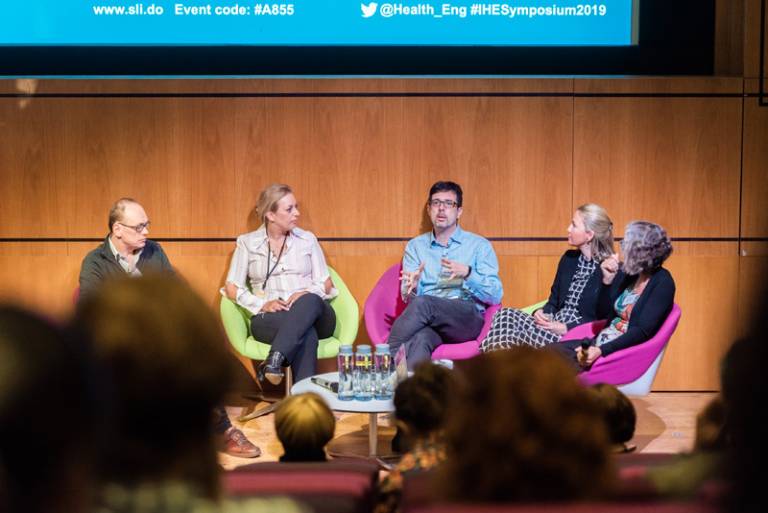
Healthy ageing panel left to right: Prof Danny Alexander, Dr Evangelia Chrysikou, Dr Sergi Costafreda Gonzalez, Prof Ann Blandford
Translation
After another panel discussion on spin-out companies, the day ended on a powerful note, as we heard about the strong impact UCL research has had on people’s lives.
Dr Sue Pringle is the mother of Marchant Barron, a 23-year-old man with dystonic cerebral palsy. She described the challenges of finding technology that lets Marchant move independently while giving him the physical support he needs. She read out Marchant’s words:
““When I was five-years-old I thought I was stupid. Other children had worked out how to walk but I couldn’t. I needed to move, I dreamt of running”.
“I’ve broken many chairs and chairs have broken me. Torn my skin, bent my bones, warped my muscles. Somehow I’ve learnt to tolerate it. Chairs define what I do”.
Sue and her husband are both scientists, and when Marchant was little they customised and created their own mobility chairs for Marchant. Now, as he’s an adult, finding a chair which works for him has become more difficult.
Sue and Marchant are now working with Dr Tim Adlam (Global Disability Innovation Hub) to create a solution. Tim specialises in creating technology for people with movement disorders, so they can explore their full capability. He said, “we learn to move, but we also move to learn”.
Sue and Tim’s talk was a reminder about what our ultimate focus always needs to be – not technology for technology’s sake, but technologies that transform lives across the globe.
Related links:
UCL hosts minister as part of Tomorrow’s Engineer Week
 Close
Close

